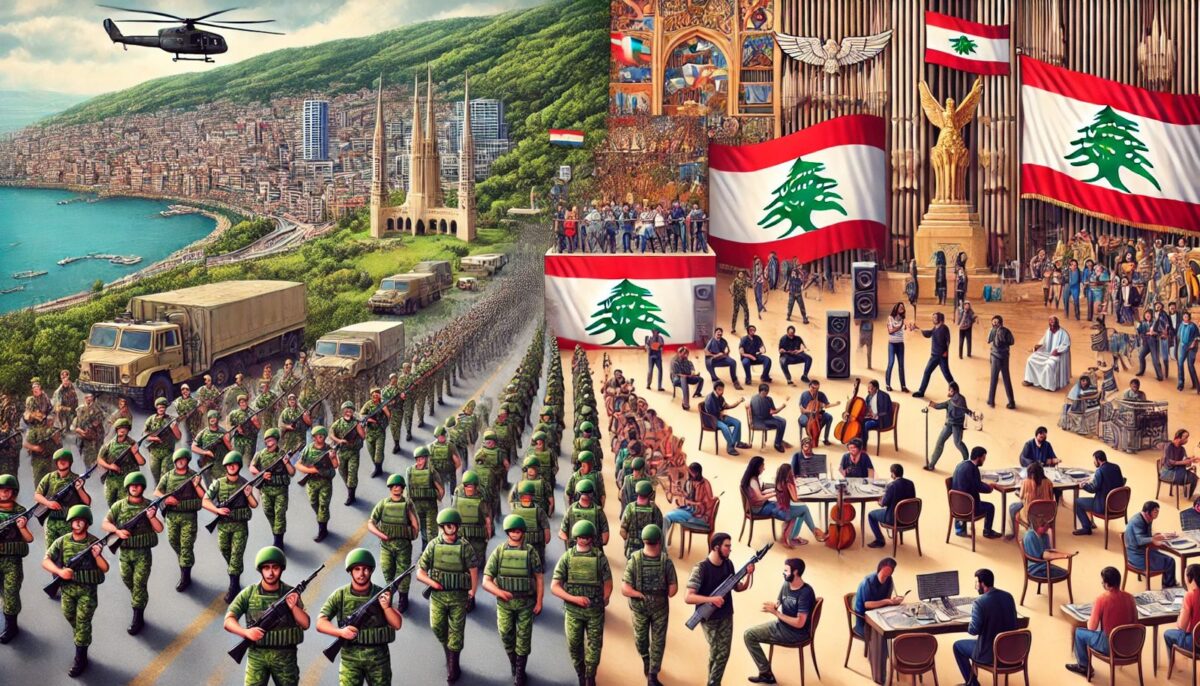
Between discipline and fear, the use of military attire and organized marches in Lebanon serves as a powerful symbol, signaling the parties’ readiness for conflict and reminding both their supporters and opponents of their strength. However, it contributed to the marginalization of intellectual leadership, overshadowed by the intimidation of military means
A few days ago, members of the Syrian Social Nationalist Party (SSNP) marched into the Dhour Shweir International Jazz Festival as part of their annual commemoration of the killing of their founder, Antoine Saade, who was executed on July 8, 1949. While the SSNP claims this route is public and integral to their demonstration, the real issue goes beyond their choice of location. It raises a fundamental question about our political culture: why do different groups in Lebanon feel empowered by militaristic marches?
A legacy of conflict
Lebanon’s history is marred by a series of conflicts, most notably the Lebanese Civil War from 1975 to 1990. Many of today’s political parties, including the SSNP, have their actual roots as militias that were formed or that developed during these turbulent times. The legacy of these conflicts, as it seems, has entrenched a culture of militaristic expression among political factions. For many, military-like displays are perceived to be a show of strength and a symbol of their readiness to defend their interests, at any cost apparently.
Symbolism of military gear
The use of military attire and organized marches serves as a powerful symbol. It is a way for parties to signal their readiness for conflict and to remind both their supporters and opponents of their strength. This kind of display can foster a sense of unity and discipline within the party, but it also perpetuates a climate of fear and intimidation.
Are we ready for another war?
Despite these displays, it is questionable whether Lebanon is prepared for another conflict. The country is currently facing severe economic, social, and political crises. Unemployment is high, the currency has collapsed, and basic services are failing. In this context, the specter of war is something most Lebanese people dread rather than support. Many Lebanese citizens remember the devastating impacts of the civil war and are keenly aware of the toll another conflict would take.
The marginalization of intellectual leadership
One of the most troubling aspects of this militaristic culture is the marginalization of intellectuals, cultural leaders, and thinkers within political movements. These individuals have the potential to offer alternative perspectives and solutions that move away from the cycle of violence. However, in many parties, those who demonstrate tangible power through military means often overshadow intellectual and cultural voices.
A call for alternative expressions
There is a critical need for alternative forms of political and cultural expression in Lebanon. Peaceful demonstrations, cultural festivals, and intellectual debates could serve as platforms for expressing grievances and ideas without resorting to shows of force. We recognize the strength of these groups; it’s evident and acknowledged. Haven’t we yet realized that violence as a means of resolving conflicts is ineffective?
The SSNP march at the Dhour Shweir festival was a reminder of Lebanon’s entrenched militaristic culture. While these displays of power may be rooted in historical necessity, they are increasingly out of step with the public desire for a peaceful, stable and prosperous future. To move forward, Lebanon must reevaluate this legacy and prioritize the voices of thinkers, cultural leaders, and visionaries who can guide the country towards stability and peace.
We need to foster a culture of dialogue. We need to fundamentally reduce reliance on militaristic expressions so that Lebanon can begin to heal the wounds of its past and build a more inclusive and peaceful society. The path to this future lies in the hands of those who can inspire with ideas, not intimidate with force.
Ramzi Abou Ismail is a political psychologist and researcher at the University of Kent.
The views in this story reflect those of the author alone and do not necessarily reflect the beliefs of NOW.








